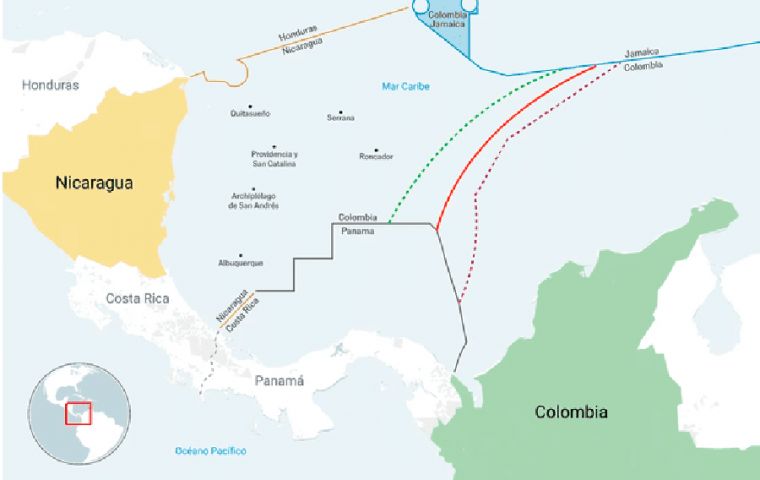MercoPress. South Atlantic News Agency
No continental shelf extension for Nicaragua onto Colombian islands, ICJ rules
 “Great victory for Colombia in The Hague,” Petro announced
“Great victory for Colombia in The Hague,” Petro announced The International Court of Justice Thursday ruled in favor of Colombia, thus rejecting Nicaragua's request for the maritime space surrounding the islands of San Andres and Providencia, it was announced at The Hague.
As per the ICJ's decision, Nicaragua cannot extend its continental shelf beyond the 200 nautical miles that delimit its maritime border with Colombia, it was explained. The area is said to be rich in gas, oil, and fishing resources. The judgment does not affect Nicaragua's rights to its continental shelf beyond 200 miles in other areas of the Caribbean.
“The Court, by 13 votes to 4, rejects the petition of the Republic of Nicaragua,” ICJ Chief Justice Joan E. Donoghue said. The ICJ also rejected that the archipelago of San Andres, Providencia, and Santa Catalina was within the limits of Nicaragua's maritime border.
“Great victory for Colombia in The Hague. The ICJ did not accede to Nicaragua's claims to expand its continental shelf. We hope with this ruling to close the boundary dispute and focus on bringing sustainable development to our archipelago,” Colombian President Gustavo Petro said on Twitter.
Gran victoria para Colombia en La Haya. La CIJ no accedió a las pretensiones de Nicaragua sobre expandir su plataforma continental. Esperamos con este fallo cerrar la controversia limítrofe y abocarnos a llevar desarrollo sostenible a nuestro archipiélago.
— Gustavo Petro (@petrogustavo) July 13, 2023
The Court confirmed the maritime limits already set in 2012, when it granted sovereignty over those islands to Colombia, but forced it to cede almost 75,000 square kilometers of the Caribbean Sea to the Central American country.
Managua considered that there was a natural extension of the continent that extended beyond its 200 maritime miles and in 2013 filed a lawsuit before the ICJ.
During the trial, Colombia's lawyers argued that Bogota did not sign the United Nations Convention on the Law of the Sea, which recognizes continental shelves.
The Court concluded that, under customary international law, a country's right to a continental shelf beyond 200 nautical miles cannot extend onto the baselines of another State. “It follows that, irrespective of any scientific and technical considerations, Nicaragua has no right to a continental shelf extending within 200 nautical miles from the baselines of the continental coast of Colombia,” the judgment describes.
“The Court concludes that the continental shelf cannot extend overlapping over another State,” Donoghue said.
The Court argued that the sovereignty of San Andres and Providencia would be affected if such a claim favored Nicaragua.
Although the archipelago is 110 kilometers from the Nicaraguan coast and 720 kilometers from the Colombian coast, sovereignty over it belongs to Colombia, a fact ratified by the Court in 2012.
In Managua, “The Government of Reconciliation and National Unity reaffirms its firm commitment to the rule of law at the international level and the peaceful settlement of disputes between States and recognizes this sentence as firm, definitive and of obligatory compliance,” the Nicaraguan Executive said in a statement.
In the document, read through official media by Vice President Rosario Murillo, Nicaragua noted that its appeal against Colombia before the highest Court of Justice, “and the repeated presence of Nicaragua before the Court since 1984, is a tangible demonstration of that commitment.”
“Likewise, Nicaragua expects Colombia to recognize the value and effectiveness of all the judgments of the Court, in particular the judgment issued in 2012,” Murillo also stressed while recalling that on November 19, 2012, the ICJ issued a judgment delimiting Nicaragua's Exclusive Economic Zone in the Caribbean Sea up to 200 nautical miles from the baselines of the Nicaraguan coasts, and that Colombia has refused to comply with that judgment.
“Colombia refused to comply with that judgment from the very day it was issued and subsequently denounced the Pact of Bogotá in an attempt to prevent Nicaragua from being able to go to the Court again to denounce violations of Nicaraguan sovereign rights and maritime spaces in the Caribbean Sea,” she added.




Top Comments
Disclaimer & comment rules-

-

-

Read all commentsThe courts final decision on the boundary.
Jul 15th, 2023 - 01:49 pm 0https://www.icj-cij.org/sites/default/files/multimedia-galleries/20121119_nicol/03.jpg
Something the Greeks and Turks might want to look at.
I don't think this dispute is reasonable. It's like the State of Minas Gerais complaining about the State of Goiás.
Jul 15th, 2023 - 09:26 pm 0They should unite. Only one Spain in the Americas!
https://www.youtube.com/watch?v=2O40qCivS74&list=FLmXPTu1f8AdGlizWNiASx2A&index=3
Then there would be only one dictator. The others would have to give up their power.
Jul 15th, 2023 - 10:56 pm 0Which dictator do you think should rule New Spain?
From which countries do you think this new dictator should come from?
Commenting for this story is now closed.
If you have a Facebook account, become a fan and comment on our Facebook Page!